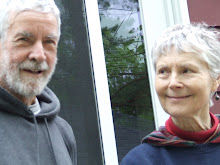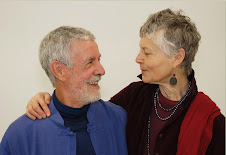Dear Family and Friends,
It'll be serious enough within the next few days learning what the biopsy reveals. But I discovered tonight how ignorance and misinterpretation can sound a false alarm.
When Francis' nurse told us last night as we chatted a long time, that a living will was not enough to prevent a medical rescue if "something happened" to Francis, -- that we had to tell the doctor directly not to resuscitate him if that's what he wanted, my heart felt very heavy. Heavy because she repeated he was highly medicated to prevent pain, and with the side effects of that medicine, and at his age, anything could happen. I heard her say "Code 4."
So tonight when the doctor came to officially get his "advance directives," I asked her point blank: "Could you tell me honestly why Francis has been put in "Code 4 category?" She looked puzzled, - "Never heard of Code 4!" she said. Then she realized what I was alluding to, and explained that ALL patients are put BY DEFAULT into category -- "Full Code," meaning if the patient's heart stopped etc etc, they'd rush in and get it started again. The other category for all practical purposes, is "DNR," -- "Do not resuscitate."
Neither Francis, now at age 82, nor I, if I were in his shoes, would want to be resuscitated. No, not with some of us suspecting, -- but who knows... we'll know tomorrow -- maybe bone cancer? (which is very painful -- and pain is what he's dealing with.) No, in his situation, we would opt for DNR,-- as the doctor put it, -- " letting nature take its course." DNR is what he chose.
But I was relieved. It wasn't Francis specifically who was categorized as unusually vulnerable, it was regular hospital protocol! Our friend Susan Christian expressed it well in an email response when I shared my concern: "What I hope is that the code business is more a piece of hospital administrative procedure than an indication of anything imminently happening. You know how they do have to cover themselves."
Our niece/nurse Jane also made two relevant points:
1) That it's "confusing" to use the expression "Hospice palliative care." Hospice in itself is a definitive 6 month stay. But Hospice also offers outpatient "treatment modalities" of dispensing palliative treatment.
2) Secondly, when she visited Francis today Jane didn't find him very highly medicated as said to us last night. She explained that high doses of narcotics make healthy people "druggies," but when used to relieve great pain those meds are readily absorbed and don't make them "druggies."
All in all I feel hopeful tonight. Not only because of what that same nurse said, -- that even people with malignant cancer can live for years with palliative treatments which also reduce pain. But because Francis seemed more himself again tonight. Maybe he's getting more used to the very medication he couldn't tolerate before he was hospitalized. By now he's totally off IV's, just on oral meds and the pain patch. They're getting him ready to come home. I eagerly await that!
Francis has it in him to live much longer. His Aunt Irene died only two months short of 105.
Elaine
Subscribe to:
Post Comments (Atom)


















No comments:
Post a Comment